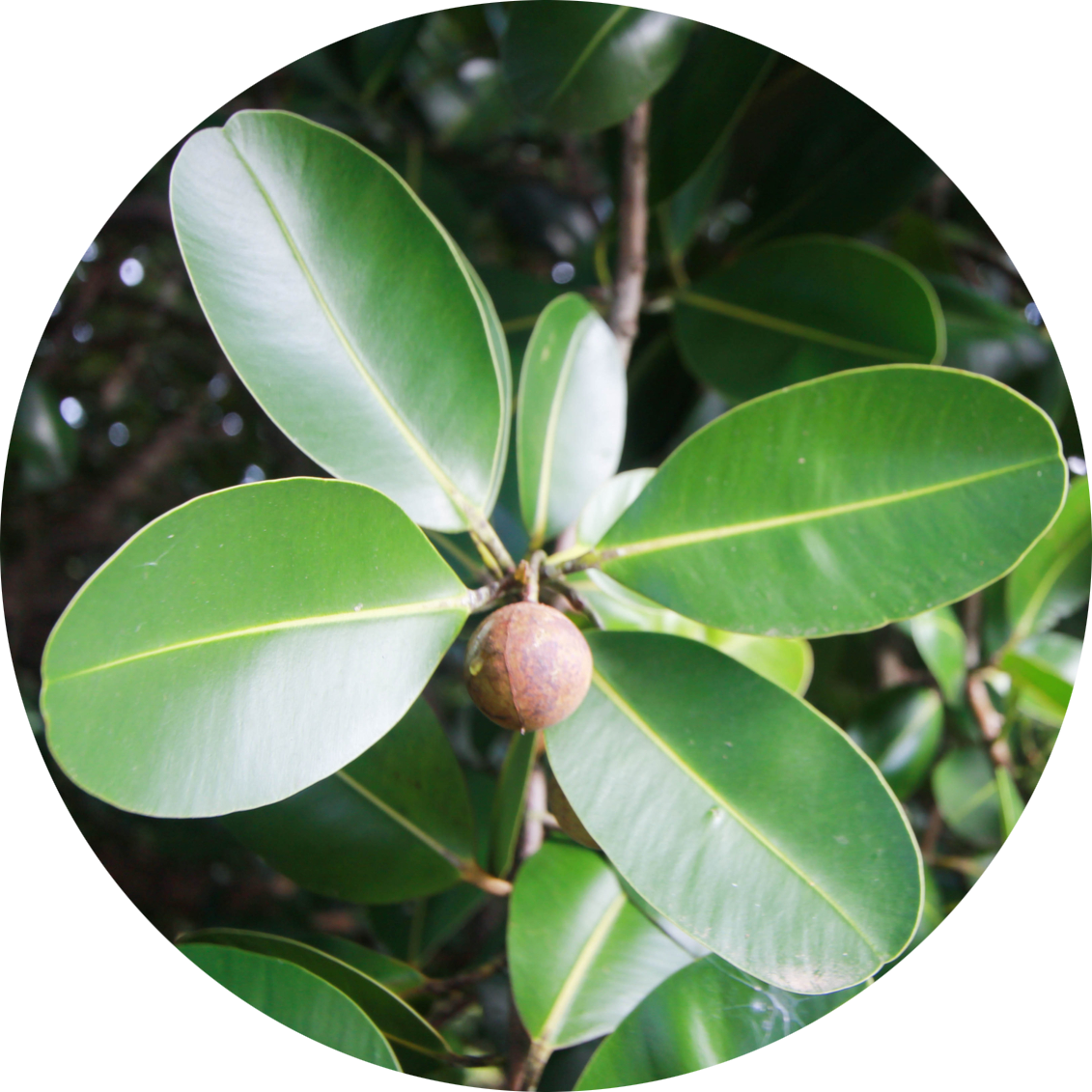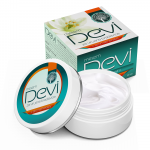To get to know the exotic fruit of tamanu, we need to travel to the other side of the planet briefly, to distant Polynesia. This region of Oceania consists of over 1,000 islands; the three corners of the Polynesian triangle are marked by Hawaii, Easter Islands and New Zealand. Special flora and fauna, as well as specific cultures have developed on these islands because they are cut off from the rest of the world due to their geographical location. It is enough to look at the colourful canvases of Paul Gauguin and his Tahitian women with flawless complexion to understand that this is a completely different world. And right there, on the islands of white sandy beaches surrounded by the turquoise sea, thrives a special plant that captivates not only with its beauty and fragrant flowers, but also with its healing properties: it is the tamanu tree.
Calophyllum inophyllum is a bright green tree with succulent leaves and round nuts from which up to 75 per cent of oil can be extracted. This oil is not edible; it can be used very effectively as an industrial lubricant. What the locals have always known is that this tree can be very useful. Numerous sculptures have been carved from its trunk, and the most famous one is Gauguin’s Hina Te Fatu from 1892, which shows the Polynesian Goddess of the Moon and the Spirit of the Earth. Hina is a representative of the female force that inspired generations of Tahitians, just like those that inspired Gauguin himself. The inspiration came from those who collected the fruits of the earth and used them to raise, feed and treat their children and compatriots, and those who smashed, ground and strained the fruits of the tamanu tree.
MEDICINAL FRUIT
The fruit of the tamanu tree produces a thick dark green oil full of resin with which the Tahitians restrain their thick, black hair. It was established in 1951 what is therapeutic in this fruit. It was then that the first polyphenol from tamanu oil was discovered – calophyllolide, a lactone with special anti-inflammatory properties and a hydrocortisone-like effect. It is also a treasure trove of medicinal fatty acids: palmitic, stearic, oleic, linoleic and erucic. So, it is no coincidence that the people of Tahiti used it to heal wounds and burns. Modern studies have proven that tamanu oil is a powerful healing and antimicrobial agent and that its traditional use to treat skin injuries, scars and infected wounds, as well as skin diseases such as dermatoses, urticaria and eczema is justified. The antibiotic properties of this oil have always cured even the most complicated wound infections in the tropics.
Further research has confirmed that tamanu oil has a wide range of effects:
- antioxidant
- UV protective
- antimicrobial (antibacterial and anti-fungal)
- antiviral
- anti-inflammatory
- healing (dermal and epidermal)
Tamanu oil can be applied to the skin and mucous membranes affected by all types of disorders. Calophyllic acid and lactone with antibiotic properties as well as secondary metabolites, coumarins, xanthones, flavonoids and tripertenes from this oil soothe skin inflammation, destroy bacteria and viruses, including Staphylococcus aureus and protect skin’s immunity with antioxidant action.
Studies have shown that tamanu oil destroys as many as 30 strains of bacteria and that it is especially effective against gram-positive bacteria; therefore it is also used as an ingredient in oral hygiene products. It is also useful for vaginal infections and is becoming an increasingly common ingredient in vaginal gels or vaginal suppositories.
The antiviral properties of tamanu oil are especially good to treat herpes (Herpes simplex); as it is known that herpes can also cause viral warts, tamanu oil is ideal for their removal in which case it does not only destroy the virus, but also heals and eliminates scars. A Japanese study has even proved that this oil can have antitumor action.
In addition to skin problems, tamanu also works deeper – hence it is used to treat the symptoms of neuralgia, rheumatism and sciatica, varicose veins and inflammatory conditions.
TAMANU AND COSMETICS
Today’s cosmetics industry has recognised the ability of this oil to stimulate skin regeneration and collagen production, so it is more and more often an ingredient used in cosmetic preparations and formulas, from sun protection products to those that soothe irritations, to creams and lotions against wrinkles and stretch marks and can also be used for daily skin care. Experience with tamanu oil in France has shown that it is ideal for treating scars. Tamanu oil is suitable for all skin types, especially for sensitive, mature and dry skin. It helps with irritations caused by shaving, waxing or sunbathing. In Fiji, it is traditionally used to treat baby rash and also to treat dry and chapped lips. It is easily absorbed, light and does not leave any greasy marks.
Oleic and linoleic acid give this oil strong hydrating properties, while its antibacterial and anti-inflammatory effect is of great benefit for the treatment of acne. As tamanu oil stimulates collagen production, it is ideal for anti-wrinkle preparations for mature skin. The antioxidant properties of this oil protect the skin from harmful free radicals caused by sun exposure and pollution. The anti-inflammatory effect of tamanu oil does not only cure skin disorders such as psoriasis, eczema or rosacea, but also repairs visible skin damage caused by them.
Tamanu oil has been giving Tahitians a flawless complexion for centuries and today it is also available to us. Although it originates from Polynesia, tamanu is now grown throughout the tropics. As is the case with all oils, it is very important to seek good quality and cold pressed ones. Tamanu oil is especially therapeutic in synergy with other oils and butters with similar properties. In combination with castor oil, the essential oils of lavender, lemon, ravensara, tea tree, cloves, as well as willow bark extract, tamanu oil contributes to the elimination of viral skin infections – viral warts – thanks to its antimicrobial action. Tamanu oil and all these other ingredients are part of Devi viral warts balm, a completely natural and top quality formula that completely eliminates viral warts in a simple and painless way, leaving behind soft and strong scar-free skin.

